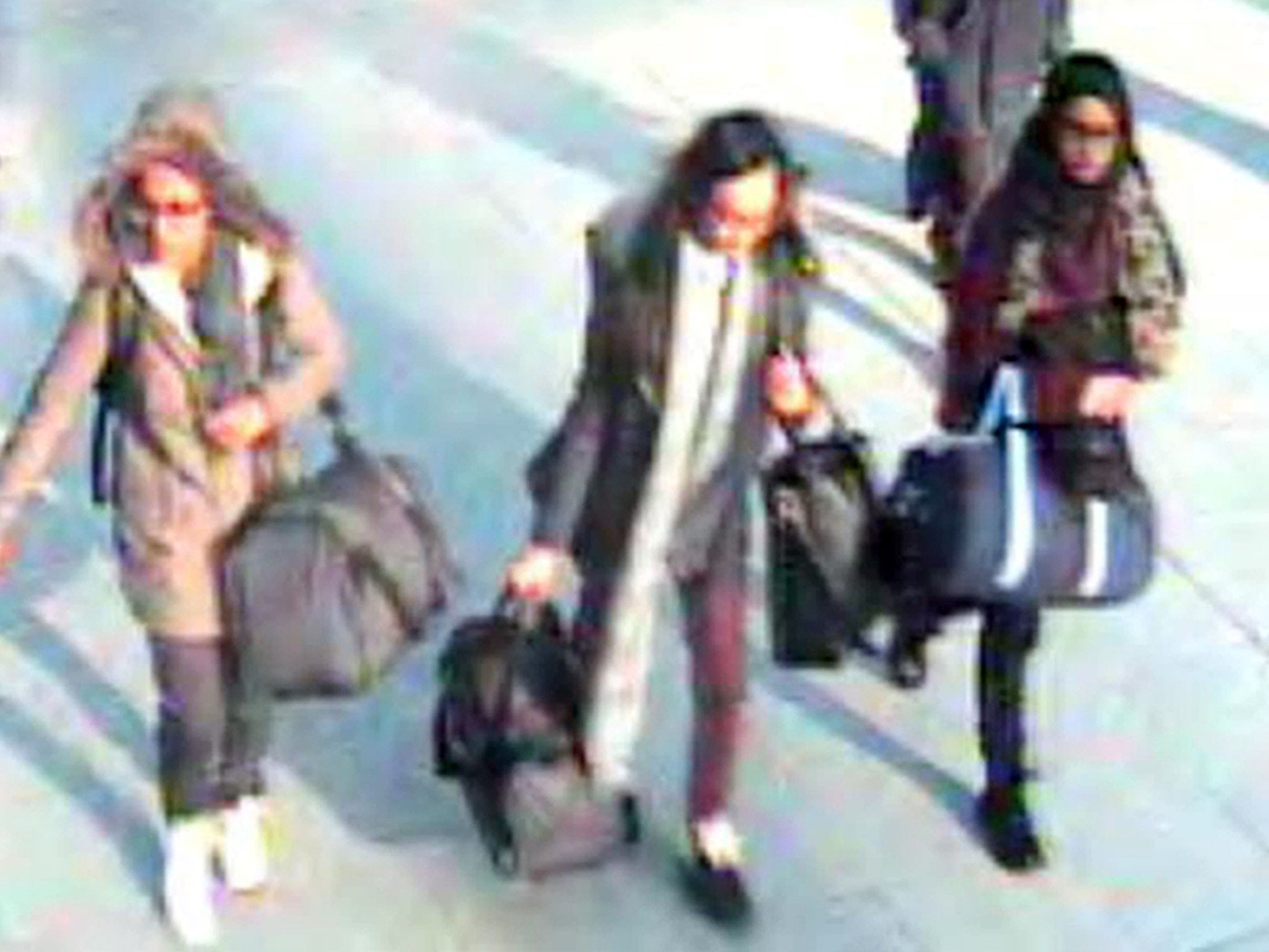Shamima Begum: ‘Silly little girl’ who fled UK for Isis at 15 may finally account for actions in court
Analysis: Ruling that Begum should be allowed to return to Britain for legal battle, the Court of Appeal said proceedings must determine why and how she left. Lizzie Dearden reports

The last photo of Shamima Begum on British soil shows her strolling through security at Gatwick airport, wearing a bright top and leopard-print jacket.
Then 15, she was about to fly to Turkey with fellow Bethnal Green Academy pupils Amira Abase and Kadiza Sultana.
Begum was travelling on her older sister’s passport, and all three girls wore bright western clothing that let them blend in with holidaymakers during the half-term break.
But the trio travelled onwards from Istanbul to Isis territory in Syria, where Sultana was reportedly killed in a Russian airstrike.
The whereabouts of Abase are unknown but she is believed to have survived, alongside friend Sharmeena Begum (no relation) who travelled ahead of them.
Begum’s activities in the intervening years are not fully known.
Sources have claimed that Begum joined Isis’s “morality police”, tried to recruit other women and even stitched suicide bombers into explosive vests.
She has not admitted having any formal role in the so-called Islamic State, but told journalists that she married a Dutch fighter days after arriving in Raqqa in 2015.
Her comments in a series of interviews provoked outrage in the UK and have been incorporated into security service assessments on dangerousness.
One such assessment given to the Court of Appeal referred to Begum’s comments to The Times, where she talked about seeing a severed head in a bin for the first time.
“It didn’t faze me at all,” Begum said. “It was from a captured fighter seized on the battlefield, an enemy of Islam.”
She added: “I'm not the same silly little 15-year-old schoolgirl who ran away from Bethnal Green four years ago. I don’t regret coming here.”
Begum had not been heard of for four years until she was discovered by Anthony Loyd in a Kurdish-run camp for Isis families.
Heavily pregnant, she had already buried two children and was to lose the baby boy born in al-Hawl last year.
Sajid Javid quickly moved to strip Begum of her British citizenship on national security grounds, sparking fierce debate about government responsibility amid Kurdish calls for Isis detainees to be repatriated.
She is one of dozens of alleged Isis members to have been subject to the same measure, as the government attempted to prevent their return.
But the Court of Appeal has ruled that Begum should be allowed to enter the UK once again to fight a legal battle to regain her British citizenship.
The Home Office is fighting the unprecedented judgment, which risks bringing authorities’ failures to prevent Begum and more than 900 other Britons from travelling to Iraq and Syria back into focus.
The “Bethnal Green girls’” disappearance on 17 February 2015 sparked public outrage, directed mainly at the police, questioning how three teenage girls known to be at risk of radicalisation were able to make the journey.
Legal representatives for the Begum family said they were not told she had been interviewed by police when Sharmeena left for Syria the previous December.
Seven of Sharmeena’s friends were allegedly spoken to, including Begum, Abase and Sultana, and the encounter may have accelerated their plans to leave Britain.
Police gave a letter warning of Sharmeena’s departure to the girls and other Bethnal Green Academy pupils, but they did not pass it on to their parents.

Begum is believed to have been in contact with another British Isis recruit, Aqsa Mahmood.
The former university student ran a prolific blog and social media accounts under the name Umm Layth, where she frequently called for other young British women to travel to Isis territories.
Mahmood was made subject to international sanctions in 2015 for “recruiting others, particularly women, to join Isis and using social media to offer advice on how to travel to Syria”.
A UN report released last year warned that “jihadi bride” stereotypes were causing female Isis members to be dangerously underestimated by security services.
“Women play important roles in Isis’s recruitment and propaganda activities,” it said. “Even if women do not fight, they can still spread radical ideas and encourage others to commit attacks.”
A security service assessment given to the Court of Appeal said that people who were “radicalised whilst minors may be considered victims”, but that Begum presented a threat to the UK.
A lawyer representing the government said she had joined Isis of “her own free will” and remained with the group until she was captured by Kurdish forces, claiming that her current circumstances are “self-inflicted”.
But in his judgment, Lord Justice Flaux said he would be “uneasy taking a course which, in effect, involved deciding that Ms Begum had left the UK as a 15-year-old schoolgirl of her own free will” when she could not effectively communicate with lawyers.
The judge said the “circumstances in which she left the UK in 2015 could only properly be determined after a fair and effective appeal”.
Lord Justice Flaux said that Begum could be arrested on her entry into Britain, and charged with terror offences if the evidence threshold is reached.
Whether it is during criminal proceedings or her citizenship battle, Begum may finally be forced to answer for her actions in court.
Join our commenting forum
Join thought-provoking conversations, follow other Independent readers and see their replies
0Comments